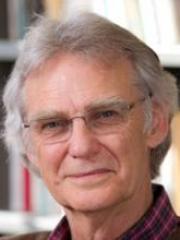



Our imaginings about the afterlife, both after death and after the end of history, are a testimony to the hope that many have had, and still do, for an extension of life beyond the grave.
-Philip Almond

Answer to the Picture Riddle Challenge: Angel!

Philip Almond is Emeritus Professor of Religious Studies at the University of Queensland in Australia. He also acts as the Deputy Director of the Centre for the history of European Discourses. He has been a historian of religious thought and has engaged in the study of religion for over fifty years.

Scott Kershner is the Chaplain at Susquehanna University. As an ordained Lutheran pastor (ELCA), his ministry outreach has spread from Brooklyn, NY to the remote Cascade Mountains of Washington. He seeks to honor and support religious and non-religious communities at Susquehanna while building bridges of understanding across lines of difference.
1. Why do humans continue to incorporate beliefs about the afterlife into their major religions?
2. What are your personal beliefs on life after death and where do those beliefs come from?
3. What influences our beliefs on the afterlife and how can we ask questions to expand those influences?
1. Have students choose a religion they're unfamiliar with and research their afterlife beliefs. Then, get in groups and compare the different beliefs.
2. Have students write a short persuasive piece on why their beliefs about the afterlife are accurate. In groups, have other students ask questions.
What happens when we die? There is perhaps no more fundamental human curiosity than this, and nowhere do we bump up more profoundly against the limits of human knowledge.
In “A Brief History of the Afterlife,” Philip Almond explores how understandings of the afterlife have themselves changed greatly within Western culture over time. Almond surveys different and sometimes contradictory and competing afterlife narratives from the ancient Greeks, Hebrews and early Christians through to the modern era. He helps us see that our ideas about the afterlife tell us a great deal about our deepest human desires and needs: for hope in a world in which it often seems in short supply, and for justice capable of righting the wrongs of life and history.
Yet, ideas about the afterlife amount to more than abstract speculation. They help influence material life here and now, shaping how we act and instructing us on what to value.
The afterlife is a rich topic to explore within the theme of curiosity. To be curious about the afterlife is not only to ask: Is there life beyond the grave and what might it be? We are also invited to be curious about ourselves: Who are we and what is our historical context? These shape the questions we ask and the answers we give to these most fundamental human questions.
—Scott Kershner
"That part of the human being that survives death is known in Christianity, Islam, and Judaism as the soul, the very essence of the individual person that must answer for its earthly deeds, good or bad. Hinduism perceives this spiritual essence as the divine part of a living being, the atman, which is eternal and seeks to be united with the Universal Soul, or the Brahman. Buddhism teaches that an individual is but a transient combination of the five aggregates (skandhas )—matter, sensation, perception, predisposition, and consciousness—and has no permanent soul"